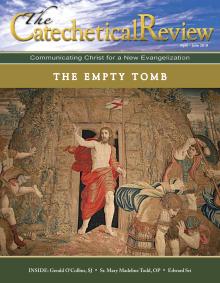 Is “discipleship” just another trendy Catholic catchphrase? Although there’s a lot more emphasis on discipleship today, some parish leaders admit not having a clear understanding of what exactly discipleship is and how this theme can impact catechetical ministry. Some even wonder if it’s just a passing trend. As one parish leader recently said to me, “Discipleship?…Oh, this is just another Catholic buzz word that happens to be in vogue now…It will fade away in a few years….I’m just going to keep doing what I’ve been doing.” Part of the problem might be the lack of a consistent vision being casted for discipleship. Individual parishes, apostolates, or diocesan leaders each often come up with their own views on discipleship. But given the importance of this theme, imagine if we were all on the same page in offering a picture of discipleship that was truly shaped by God’s Word. What if we were to offer parish leaders a more consistent and more robust picture of discipleship—one grounded in Jesus’ public ministry and rooted in the Church’s teachings on catechesis? As we’ll see, this exciting biblical vision for discipleship would equip pastoral workers with a powerful framework for evangelization and deepening people’s relationship with Christ.
Is “discipleship” just another trendy Catholic catchphrase? Although there’s a lot more emphasis on discipleship today, some parish leaders admit not having a clear understanding of what exactly discipleship is and how this theme can impact catechetical ministry. Some even wonder if it’s just a passing trend. As one parish leader recently said to me, “Discipleship?…Oh, this is just another Catholic buzz word that happens to be in vogue now…It will fade away in a few years….I’m just going to keep doing what I’ve been doing.” Part of the problem might be the lack of a consistent vision being casted for discipleship. Individual parishes, apostolates, or diocesan leaders each often come up with their own views on discipleship. But given the importance of this theme, imagine if we were all on the same page in offering a picture of discipleship that was truly shaped by God’s Word. What if we were to offer parish leaders a more consistent and more robust picture of discipleship—one grounded in Jesus’ public ministry and rooted in the Church’s teachings on catechesis? As we’ll see, this exciting biblical vision for discipleship would equip pastoral workers with a powerful framework for evangelization and deepening people’s relationship with Christ.
Discipleship: Its Biblical Meaning
In the first-century Jewish world of Jesus, being a disciple was all about one key word: imitation. When a disciple followed a rabbi, the goal wasn’t merely to master the rabbi’s teachings but also to imitate the way he lived: the way he prayed, studied, taught, served the poor, and lived out his relationship with God day-to-day. Jesus himself said when a disciple is fully trained, he “becomes like his teacher” (Lk 6:40). And when St. Paul formed disciples of his own, he exhorted them not just to remember his teachings, but also to follow his way of living: “Be imitators of me as I am of Christ” (1 Cor 11:1). Though the word disciple (mathetes) means “learner,” biblical discipleship was very different from modern classroom learning. On a college campus, a professor might give lectures to students in a large hall; the students take notes, and they’re examined on the material later in the semester. But there’s usually not an ongoing personal relationship and sharing of life between professor and student in the university setting today. To follow a rabbi, however, meant living with the rabbi, sharing meals with him, praying with him, studying with him, and taking part in the rabbi’s daily life. A rabbi’s life was meant to be a living example of someone shaped by God’s Word. Disciples, therefore, studied not just the text of Scripture but also the “text” of the rabbi’s life. This is why Jesus didn’t simply ask his disciples to listen to his preaching in the synagogues. He said, “Come, follow me” and basically invited them on a three-year camping trip as they journeyed throughout Galilee together during his itinerant ministry. Think about that: day in and day out for three years living with Jesus! How much they would have been influenced by his example! They’d notice the way he woke up early to pray. They’d witness his compassion in helping the sick. They’d be struck by his pressing need to go out to the sinners, Gentiles, and outcasts. They’d also observe how he taught the crowds, debated his opponents, called people to repent and offered them mercy. Much of Jesus’ way of living would have “rubbed off” on his disciples.
Our Discipleship Today
So if we’re going to live as disciples of Jesus today, we must aim for a lot more than believing a set of doctrines and following the rules of our faith. All that, of course, is essential, but we must go deeper and consider what’s happening interiorly: are we moving closer to Christ, encountering him anew each day? Do we notice his ongoing call to conversion, his prompting us to give more, love more and surrender more? As disciples we are aware that Jesus is constantly inviting us to live more like him in all areas of our lives—“to think like him, to judge like him, to act in conformity with his commandments, and to hope as he invites us to.”[i] Being a disciple entails a lot more than saying and believing the right things. It’s a whole way of life—his way of life transforming me. This theme of discipleship reminds us of how being Catholic is not a stagnant reality: “I identify on this survey as Catholic”…. “I attend Mass on Sundays”….”I’m orthodox in my beliefs.” All that is very good, but living as a disciple involves something more. Discipleship is something intensely dynamic. It implies movement and transformation as the disciple deepens his friendship with Christ and becomes ever more like him. Indeed, a disciple recognizes two fundamental truths:
(A) The truth about himself: his many weakness, failures, and areas where he falls short of living like Christ.
(B) The truth about what he’s made for: being conformed to the image of Christ, living like him, thinking like him, loving like him.
A true disciple knows what he’s made for: transformation in Christ (B). But he also knows the many ways he falls short (A). Discipleship is all about moving from A to B. When our Catholic Tradition speaks of “growing in holiness,” “pursuing sanctity,” and “becoming saints,” it’s basically describing this life-long process of a Christian disciple being ever more transformed by God’s grace—being changed into Christ’s likeness “from one degree of glory to another” (2 Cor 3:18).
Four Encounter Moments - Acts 2:42
According to one ancient Jewish saying, if you encounter a rabbi, you should “cover yourself in the dust of his feet and drink in his words thirstily.” The expression likely draws on a well-known sight for ancient Jews: disciples were known for walking behind their rabbi, following him so closely that they would become covered with the dust kicked up from his sandals. This would have been a powerful image for what should happen in the disciple’s life spiritually. Disciples were expected to follow their rabbi so closely that it’s as if they would be covered with their master’s way of thinking, living, and acting. Thousands of years later, we’re called to do the same. Though we walk on roads of pavement and not dust, we are still called to be disciples—to follow our Rabbi Jesus Christ so closely that we are covered with his life, changed, and made new. But how can we do that today? In Acts 2:42, the Bible underscores four practices that marked the earliest disciples of Jesus. We can think of these as four key habits of a disciple. The disciples in the early Church devoted themselves to:
1. The teaching of the apostles
2. Fellowship
3. The breaking of bread
4. Prayers
While there are many creative ways one could sum up the various practices of a disciple, following the biblical model is best. For when the Church has summed up the Catholic Faith, it has often turned to these four points in Acts 2:42 to help categorize what it means to follow Jesus. In fact, the four pillars of the Catechism of the Catholic Church are traditionally seen as being based on these four points. So if we want a roadmap to make sure we’re on the right track in our relationship with Jesus—if we want to keep the fire of faith growing—think of these four points from Acts 2:42 as logs we add to the fire. These are four foundational “encounter moments” in the life-long journey of a disciple. The more we grow in prayer, fellowship, the sacraments, and forming our minds with the revelation of Christ, the more we encounter Jesus ever anew. For example, we ponder an aspect of the apostolic faith that stirs us to praise or challenges us to make a sacrifice. This helps us become more like Christ. We sense in prayer God calling us to change, be better in a certain area or trust him more. We experience his love and mercy in the sacraments and long to come back again. We encounter Jesus in fellowship with our neighbor, the poor, the suffering and other Christians who encourage us in the faith and provide many opportunities to grow in the love of Christ by loving the Christ who abides in them. These four devotions help us encounter Jesus ever anew—to experience his call to conversion, his gentle patience and mercy, his comfort and encouragement, and his healing grace that incrementally changes us into his likeness. As pastoral workers, we must continually grow as disciples ourselves. We must repeatedly renew our encounter with the Lord especially in these four devotions the Bible singles out for discipleship. For we cannot give what we don’t have. We will only be effective as missionary disciples to the extent that we are disciples first.
Application to Parish Ministry: Forming Disciples
In closing, here are just three examples of how we can apply the biblical discipleship model to the work in parish life. 1. A Top Priority: Evangelizing our Parishioners While, thankfully, there’s a greater awareness today of the need to go out to the peripheries and reach the “nones,” we have a lot of work to do in evangelizing the people coming to our parishes. The discipleship theme makes that clear. It sheds light on the gap oftentimes existing between a more cultural Catholicism and a faith lived out vibrantly in daily life. There may be people who show up at Mass every Sunday, volunteer at the parish, and even sing in the choir, but are they living as disciples who strive to imitate Christ? Have they even had a personal encounter with Christ that has shaped their entire lives? They might go through the outward motions of faith, but have they surrendered their lives to Christ,[ii] said “yes” to him,[iii] and taken on “a profound Christian outlook”?[iv] Is the way they think about love, marriage, success, happiness, moral truth, and the meaning of life, for example, shaped more by CNN or by the CCC? As St. John Paul II explained, many of the baptized have “accepted a secular model of thinking and living.”[v] Right within our parish walls, God is placing people whom he wants us to evangelize. Do we have an urgency about leading our parishioners to become more than Catholics who go through the motions of faith? Discipleship reminds us to form true disciples who seek to draw closer to Christ and become more like him and avoid settling for their being registered at the parish and making appearances each Sunday. 2. Programs vs. Discipleship Some parishes view the role of religious education directors as running faith formation programs—offering parishioners a buffet of talks, retreats, small group studies, and faith formation events. The biblical model of discipleship reminds us, however, that the heart of our mission is to help shepherd people through a process of growing as disciples, helping parishioners move from A to B, from where they are now to where Christ wants them to be: transformed into his likeness. Various programs and activities certainly can be helpful tools in that process, if they are used in a strategic plan of forming disciples. But as one diocesan leader admitted, faith formation in many parishes follows a Netflix model: each year we feature the latest great program to come out rather than strategically think about how to lead people through the different stages of faith development and considering what an individual might need to take the next step in their walk as a disciple. We need to do more than throw a series of programs at people, no matter how good the programs may be. We need to offer an intentional formation that facilitates both initial and ongoing conversion—one that is always inviting people to take that next step in their journey as a disciple. Ideally, we should always have something available for people at different stages in discipleship, whether it’s someone who is a “quasi-catechumen” needing an initial encounter with Christ, or an evangelized Catholic who needs to go deeper in his understanding and practice of the faith, or the well-formed Catholic who needs to be challenged and equipped to evangelize others. 3. Accompaniment: Real Discipleship St. Paul said to the Christian disciples in Thessalonica, “We gave you not only the Gospel, but our very selves” (1 Thess 2:8). Our mission in parish faith formation is the same. We’re not only called to present the faith but also to accompany the people we serve, and, like Rabbi Jesus, to share life with the disciples in our parishes. Do we enter into the world of our parishioners, know their hopes and dreams, fears and sufferings, questions and doubts? Pope Francis challenges us to avoid the temptation to think the work of evangelization and forming disciples takes place primarily in committee meetings, our offices, or even at the events and programs we offer. We should be so immersed in people’s lives that we “take on the smell of the sheep.”[vi] Investing time with people outside of the Wednesday night Bible study or Thursday morning mom’s group may be just as important as the faith formation activities themselves—and our personal investment in their lives will help those activities themselves bear more fruit. Like Paul, let’s give disciples not only the Gospel but our very selves. Edward Sri is Professor of Theology at the Augustine Institute and author of Into His Likeness: Be Transformed as a Disciple (Ignatius Press), upon which this article is based.
Notes
Photo credit: Public domain image from Wikipedia.org. This article appeared on pages 10-12 of the printed edition.
This article is from The Catechetical Review (Online Edition ISSN 2379-6324) and may be copied for catechetical purposes only. It may not be reprinted in another published work without the permission of The Catechetical Review by contacting [email protected]


















